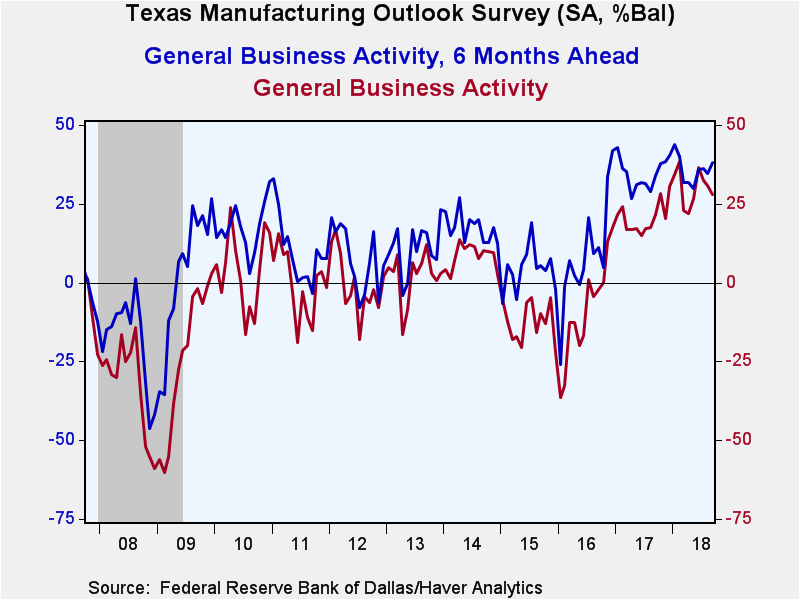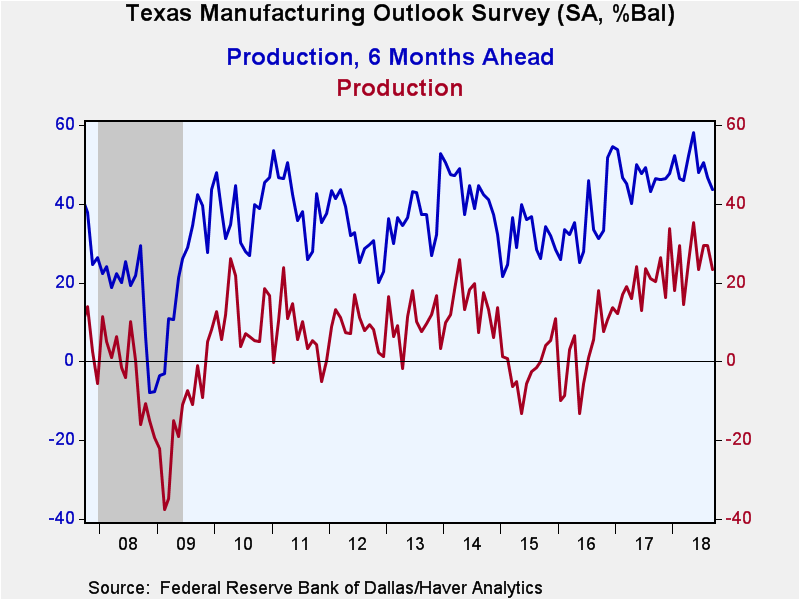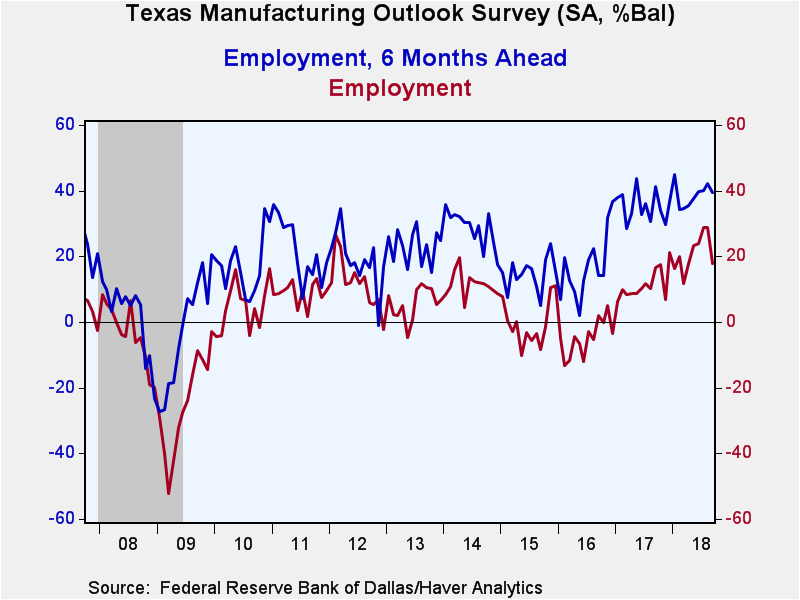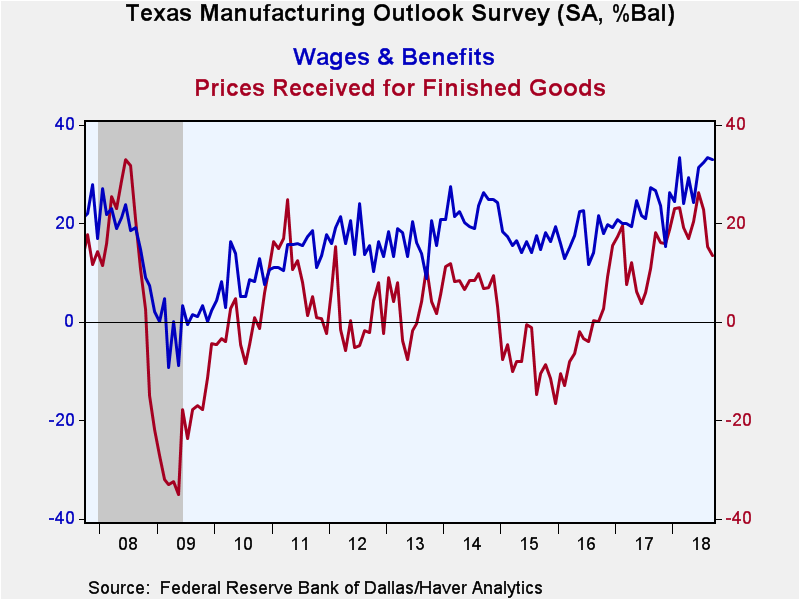 Global| Sep 24 2018
Global| Sep 24 2018Texas Factory Sector Index Retreats; Expectations Are Mixed
by:Tom Moeller
|in:Economy in Brief
Summary
The Federal Reserve Bank of Dallas indicated in its Texas Manufacturing Outlook Survey that the General Business Activity Index fell to 28.1 during September, the lowest level in four months. Despite its recent sideways movement, the [...]
The Federal Reserve Bank of Dallas indicated in its Texas Manufacturing Outlook Survey that the General Business Activity Index fell to 28.1 during September, the lowest level in four months. Despite its recent sideways movement, the index remained up y/y.
Movement amongst the sub-series was mostly negative last month. The production, shipments, new and unfilled orders readings weakened significantly. The delivery times index declined sharply and showed the quickest product delivery speeds in six months. The capital expenditures reading cratered m/m to the lowest level since November.
On the labor front, employment reversed its recent improvement with a decline to the lowest level in six months. The workweek also weakened to a six-month low. Remaining strong was the wages & benefits figure, which stayed near the highest level since January 2007.
The index for finished goods prices received added to its recent declines and fell to the lowest point since August 2017. The raw materials price measure also weakened to a four-month low.
The index of expected business conditions in six months improved m/m, but movement amongst the sub-series was mixed. Expected production, shipments and, new orders growth eased, but the unfilled orders reading improved. The future capital expenditures reading eased slightly, but remained elevated.
The future employment reading fell slightly from the highest level since January. Future hours worked held steady, but were down sharply from its high twelve months ago. Future wages & benefits surged to the highest reading since 2004.
Each index is calculated by subtracting the percentage reporting a decrease from the percentage reporting an increase. When all firms report rising activity, an index will register 100. An index will register -100 when all firms report a decrease. An index will be zero when the number of firms reporting an increase or decrease is equal. Items may not add up to 100% because of rounding. Data for the Texas Manufacturing Outlook can be found in Haver's SURVEYS database.
| Texas Manufacturing Outlook Survey (SA, % Balance) | Sep | Aug | Jul | Sep'17 | 2017 | 2016 | 2015 |
|---|---|---|---|---|---|---|---|
| Current General Business Activity Index | 28.1 | 30.9 | 32.3 | 21.7 | 20.6 | -8.9 | -12.5 |
| Production | 23.3 | 29.3 | 29.4 | 20.4 | 20.2 | 2.4 | -1.0 |
| Growth Rate of New Orders | 11.5 | 19.9 | 17.0 | 11.5 | 11.4 | -7.3 | -11.8 |
| Employment | 17.7 | 28.9 | 28.9 | 16.7 | 11.4 | -4.9 | -0.4 |
| Wages & Benefits | 33.0 | 33.4 | 32.4 | 26.8 | 22.2 | 17.6 | 16.5 |
| Prices Received for Finished Goods | 13.6 | 15.3 | 22.9 | 18.1 | 12.7 | -1.6 | -8.5 |
| General Business Activity Index Expected in Six Months | 38.0 | 34.7 | 36.2 | 33.9 | 34.5 | 8.9 | 4.1 |
| Production | 43.7 | 46.6 | 50.6 | 46.4 | 46.8 | 35.8 | 31.1 |
| Growth Rate of New Orders | 37.2 | 40.4 | 35.1 | 35.6 | 37.7 | 24.3 | 20.7 |
| Employment | 39.4 | 42.2 | 39.9 | 41.2 | 35.2 | 16.8 | 14.7 |
| Wages & Benefits | 57.4 | 45.5 | 53.2 | 39.7 | 43.4 | 34.8 | 33.2 |
Tom Moeller
AuthorMore in Author Profile »Prior to joining Haver Analytics in 2000, Mr. Moeller worked as the Economist at Chancellor Capital Management from 1985 to 1999. There, he developed comprehensive economic forecasts and interpreted economic data for equity and fixed income portfolio managers. Also at Chancellor, Mr. Moeller worked as an equity analyst and was responsible for researching and rating companies in the economically sensitive automobile and housing industries for investment in Chancellor’s equity portfolio. Prior to joining Chancellor, Mr. Moeller was an Economist at Citibank from 1979 to 1984. He also analyzed pricing behavior in the metals industry for the Council on Wage and Price Stability in Washington, D.C. In 1999, Mr. Moeller received the award for most accurate forecast from the Forecasters' Club of New York. From 1990 to 1992 he was President of the New York Association for Business Economists. Mr. Moeller earned an M.B.A. in Finance from Fordham University, where he graduated in 1987. He holds a Bachelor of Arts in Economics from George Washington University.
More Economy in Brief
 Global| Feb 05 2026
Global| Feb 05 2026Charts of the Week: Balanced Policy, Resilient Data and AI Narratives
by:Andrew Cates










